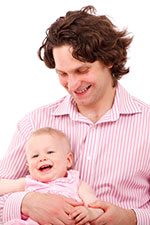 Infants and toddlers can suffer serious mental health disorders, yet they are unlikely to receive treatment that could prevent lasting developmental problems, according to research published by the American Psychological Association. This report references multiple related articles pertaining the early childhood mental health. The publisher has made the articles for available for free for an unknown length of time; check the end of this report for download links.
Infants and toddlers can suffer serious mental health disorders, yet they are unlikely to receive treatment that could prevent lasting developmental problems, according to research published by the American Psychological Association. This report references multiple related articles pertaining the early childhood mental health. The publisher has made the articles for available for free for an unknown length of time; check the end of this report for download links.
One barrier to mental health care for young children is “the pervasive, but mistaken, impression that young children do not develop mental health problems and are immune to the effects of early adversity and trauma because they are inherently resilient and ‘grow out of’ behavioral problems and emotional difficulties,” according to researchers Joy D. Osofsky, PhD, of Louisiana State University, and Alicia F. Lieberman, PhD, of the University of California, San Francisco.
Their analysis is presented in the February issue of American Psychologist as part of a special section that examines the lack of mental health care for children from birth to 5 years old. Edited by Ed Tronick, PhD of the University of Massachusetts, Boston and Osofsky, the articles explore how infants develop mental health problems, recommend improvements in diagnostic criteria, and outline public policy opportunities for psychologists and policy makers.
Contrary to traditional beliefs that infants cannot have mental health problems “because they lack mental life,” even young infants can react to the meaning of others’ intentions and emotions because they have their own rudimentary intentions and motivating emotions, according to an article by Tronick and Marjorie Beeghly, PhD, of Wayne State University. While trauma can be a significant factor in developing mental health issues, the authors encourage more study of the impact of everyday life and continual interactions between infants and parents or other caregivers.
“Infants make meaning about themselves and their relation to the world of people and things,” Tronick and Beeghly stated, and when that “meaning-making” goes wrong, it can lead to development of mental health problems. “Some infants may come to make meaning of themselves as helpless and hopeless, and they may become apathetic, depressed and withdrawn. Others seem to feel threatened by the world and may become hyper-vigilant and anxious.” Apparent sadness, anger, withdrawal, and disengagement can occur “when infants have difficulty gaining meaning in the context of relationships,” they write.
Because early childhood mental health has very few practitioners, it is often difficult for parents or children’s programs to find help when they think it is needed, according to Osofsky and Lieberman.
If they do find such help, “the cost of preventive services or treatments for children under the age of three years may not be covered by insurance or other resources,” notes another paper, by Florence Nelson, PhD, of the national nonprofit ZERO TO THREE and Tammy Mann, PhD, of the Frederick D. Patterson Research Institute.
The papers emphasize the importance of the creation and integration of services for parents and caregivers of young children so they can recognize mental health issues in infants and are able to find help.
Mental health risks to infants are magnified by the fact that “the youngest children, from birth to age 5, suffer disproportionately high rates of maltreatment with long-term consequences for mental and physical health, pediatric health, and child care providers seldom identify or refer children under 5 years old to mental health services,” according to Osofsky and Lieberman. Their study cites U.S. Department of Health and Human Services statistics from 2008 and 2010 showing that 79.8 percent of the children who died from abuse and neglect were younger than 4 years old, and that the first year of life is the most dangerous. The paper also examines the impact of poverty and points out that previous studies have revealed that “one in five children in poverty has a diagnosable mental health disorder.”
Among the researchers’ recommendations:
- Expand early screening for infants and toddlers to detect mental health issues, such as relationship disorders, depression, and self-regulation problems.
- Train professionals in mental health, pediatrics, early childhood education, child welfare, and other related professions to recognize risk factors, and ensure that undergraduate, graduate, and continuing professional education include content on infant mental health.
- Integrate infant mental health consultations into programs for parents, child care, early education, well-child health services, and home-based services.
- Address insurance and Medicaid payment policies to provide coverage for prevention and treatment of mental health issues for infants and toddlers.
Material adapted from American Psychological Association.
Downloads / References
“A Call for Integrating a Mental Health Perspective Into Systems of Care for Abused and Neglected Infants and Young Children,” Joy D. Osofsky, PhD, Louisiana State University Health Sciences Center, and Alicia F. Lieberman, PhD, University of California, San Francisco; American Psychologist, Volume 66, Issue 2.
“Opportunities in Public Policy to Support Infant and Early Childhood Mental Health,” by Florence Nelson, PhD, ZERO TO THREE, and Tammy Mann, PhD, Frederick D. Patterson Research Institute; American Psychologist, Volume 66, Issue 2.
“Infants’ Meaning-Making and the Development of Mental Health Problems,” by Ed Tronick, PhD, University of Massachusetts Boston, and Marjorie Beeghly, PhD, Wayne State University; American Psychologist, Volume 66, Issue 2.
“Developmentally Sensitive Diagnostic Criteria for Mental Health Disorders in Early Childhood: The Diagnostic and Statistical Manual of Mental Disorders-IV, the Research Diagnostic Criteria – Preschool Age, and the Diagnostic Classification of Mental Health and Developmental Disorders of Infancy and Early Childhood – Revised,” by Helen L. Egger, PhD, Duke university Medical Center, and Robert N. Emde, PhD, University of Colorado School of Medicine. American Psychologist, Volume 66, Issue 2.
No comments yet.